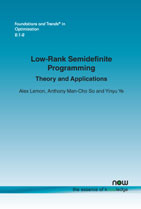Low-Rank Semidefinite Programming: Theory and Applications
By Alex Lemon, Stanford University, USA, adlemon@stanford.edu | Anthony Man-Cho So, The Chinese University of Hong Kong, Hong Kong, manchoso@se.cuhk.edu.hk | Yinyu Ye, Stanford University, USA, yyye@stanford.edu
Abstract
Finding low-rank solutions of semidefinite programs is important in many applications. For example, semidefinite programs that arise as relaxations of polynomial optimization problems are exact relaxations when the semidefinite program has a rank-1 solution. Unfortunately, computing a minimum-rank solution of a semidefinite program is an NP-hard problem. In this paper we review the theory of low-rank semidefinite programming, presenting theorems that guarantee the existence of a low-rank solution, heuristics for computing low-rank solutions, and algorithms for finding low-rank approximate solutions. Then we present applications of the theory to trust-region problems and signal processing.
Low-Rank Semidefinite Programming: Theory and Applications
Finding low-rank solutions of semidefinite programs is important in many applications. For example, semidefinite programs that arise as relaxations of polynomial optimization problems are exact relaxations when the semidefinite program has a rank-1 solution. Unfortunately, computing a minimum-rank solution of a semidefinite program is an NP-hard problem. This monograph reviews the theory of low-rank semidefinite programming, presenting theorems that guarantee the existence of a low-rank solution, heuristics for computing low-rank solutions, and algorithms for finding low-rank approximate solutions. It then presents applications of the theory to trust-region problems and signal processing.
